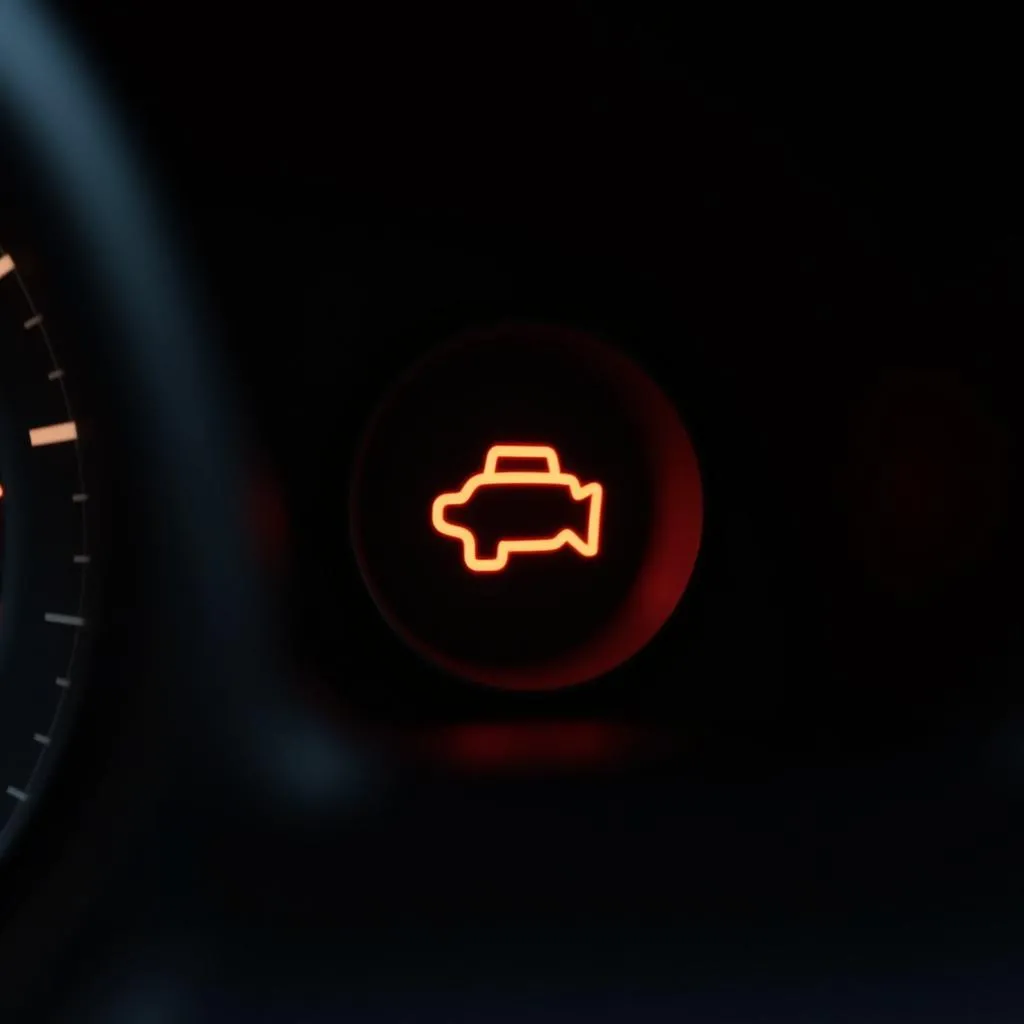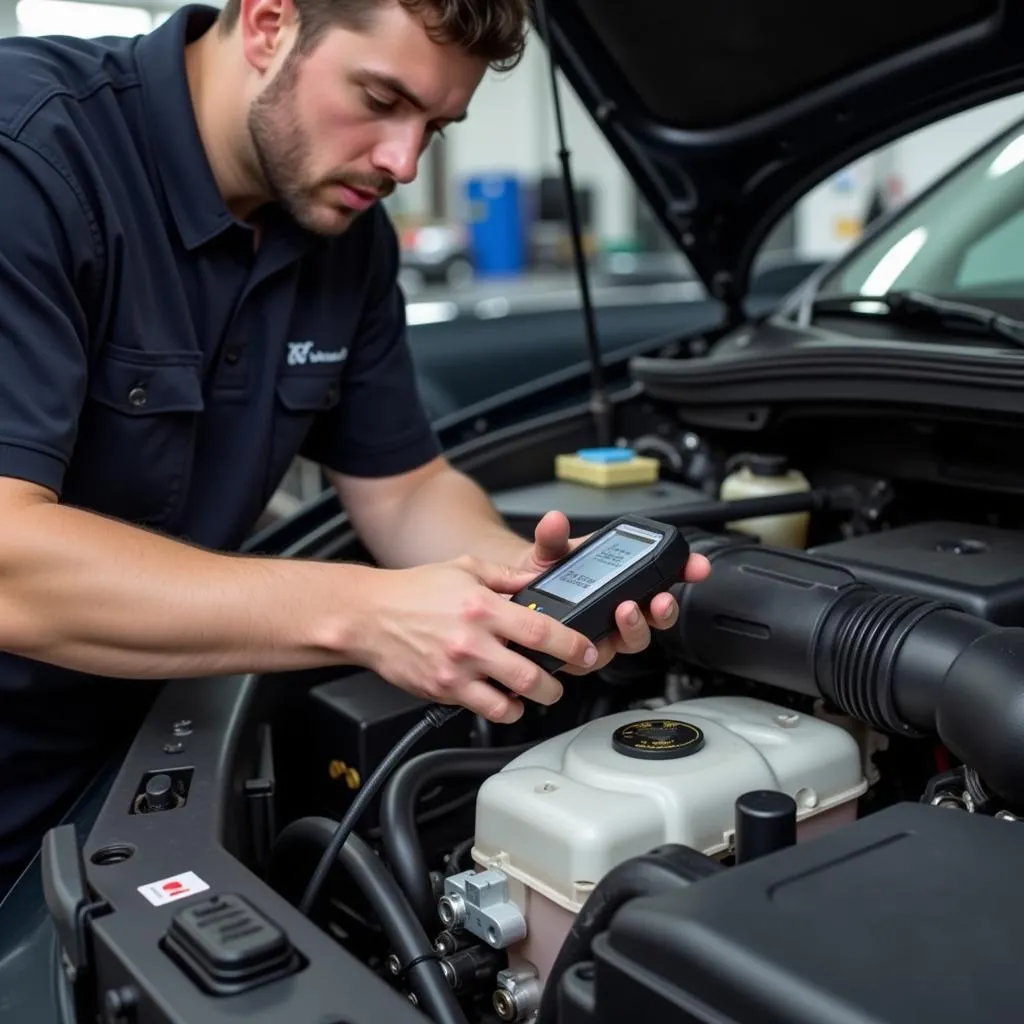A check engine light appearing on your dashboard can be alarming, leaving you wondering about the cause and potential solutions. This small light is a crucial part of your vehicle’s onboard diagnostic system, acting as a check engine light detector, alerting you to potential issues within your car’s engine or emission control system.
What Triggers the Check Engine Light?
Your car’s computer system continuously monitors various sensors throughout the engine and related components. When it detects a problem, it triggers the check engine light. This problem could be as simple as a loose gas cap or as complex as a malfunctioning catalytic converter.
Here’s a breakdown of common reasons for the check engine light to illuminate:
- Emissions System: Issues with the oxygen sensor, catalytic converter, or evaporative emissions system can trigger the light.
- Ignition System: Faulty spark plugs, spark plug wires, or ignition coils can cause misfires, leading to the check engine light.
- Fuel System: Problems with the fuel injectors, fuel pump, or fuel pressure regulator can affect engine performance and trigger the light.
- Air Intake System: A dirty air filter, malfunctioning mass airflow sensor, or vacuum leak can disrupt the air-fuel mixture, activating the warning.
- Sensor Malfunctions: Various sensors, such as the throttle position sensor or crankshaft position sensor, can fail, causing the light to come on.
The Importance of a Check Engine Light Detector
Ignoring a check engine light can lead to more severe engine problems and costly repairs in the long run. While the light itself doesn’t provide specific details about the issue, it serves as a crucial check engine light detector, prompting you to investigate further.
Here’s why you should never ignore this warning:
- Prevent Further Engine Damage: Addressing the underlying issue early can prevent more significant damage to your engine and other components.
- Maintain Fuel Efficiency: Problems affecting engine performance can significantly reduce your car’s fuel efficiency, costing you more at the pump.
- Reduce Emissions: A malfunctioning emissions system not only triggers the check engine light but also increases your vehicle’s harmful emissions.
- Pass Emissions Tests: A check engine light will often result in a failed emissions test, preventing you from renewing your vehicle registration in many areas.
 Check Engine Light on Car Dashboard
Check Engine Light on Car Dashboard
Diagnosing the Check Engine Light
When the check engine light illuminates, the first step is to determine the severity of the problem. A flashing check engine light generally indicates a more serious issue requiring immediate attention. A steady check engine light, while less urgent, still requires prompt diagnosis.
Here are the common methods used to diagnose a check engine light:
-
OBD-II Scanner: An OBD-II (On-Board Diagnostics) scanner is a handheld device that connects to your car’s computer system. It reads the diagnostic trouble codes (DTCs) stored in the computer, providing clues about the specific issue.
-
Professional Mechanic Diagnosis: If you’re uncomfortable diagnosing the issue yourself, a qualified mechanic can use advanced diagnostic tools to pinpoint the problem and recommend the necessary repairs.
 Mechanic Using OBD Scanner on a Car
Mechanic Using OBD Scanner on a Car
Common Check Engine Light Myths Debunked
Several myths surround the check engine light, often leading to unnecessary worry or delayed repairs. Let’s debunk some of the most common ones:
Myth: The check engine light always means a major engine problem.
Fact: As mentioned earlier, the check engine light can be triggered by various issues, from minor problems like a loose gas cap to more significant engine malfunctions.
Myth: You can continue driving with the check engine light on.
Fact: While a steady check engine light might not indicate an immediate need to stop driving, ignoring it can lead to more severe problems. It’s crucial to have the issue diagnosed promptly.
Myth: Disconnecting the battery will reset the check engine light and solve the problem.
Fact: While disconnecting the battery can temporarily reset the check engine light, it doesn’t address the underlying issue. The light will reappear once the car’s computer system runs its diagnostic cycle again.
Preventing Future Check Engine Light Issues
While not all check engine light issues are preventable, following regular vehicle maintenance schedules can significantly reduce their likelihood.
Here are some preventive measures:
- Regular Oil Changes: Follow your car manufacturer’s recommended oil change intervals to keep your engine lubricated and running smoothly.
- Air Filter Replacement: A dirty air filter restricts airflow to the engine, potentially impacting performance and triggering the check engine light. Replace it as recommended by your car’s maintenance schedule.
- Fuel System Cleaning: Periodically cleaning your car’s fuel injectors and fuel lines can prevent clogs and ensure optimal fuel delivery, reducing the risk of check engine light issues.
- Check Your Gas Cap: A loose or damaged gas cap can cause fuel vapors to escape, triggering the check engine light. Ensure it’s always securely tightened after refueling.
Conclusion
The check engine light detector, although a simple warning light, plays a vital role in maintaining your car’s health and performance. Understanding its importance, the potential causes for its illumination, and the steps to take when it appears can save you from costly repairs and ensure a smoother driving experience. Remember, early detection and diagnosis are key to resolving check engine light issues effectively.
FAQ
Q: Can I check the engine light code myself?
A: Yes, you can use an OBD-II scanner to read the diagnostic trouble codes stored in your car’s computer system. However, interpreting these codes and diagnosing the issue accurately often requires mechanical expertise.
Q: How much does it cost to fix a check engine light issue?
A: The cost of fixing a check engine light issue varies greatly depending on the underlying problem. Minor issues like a loose gas cap can be inexpensive to fix, while major engine repairs can be costly.
Q: Should I be concerned if the check engine light is flashing?
A: A flashing check engine light generally indicates a more serious issue requiring immediate attention. It’s crucial to avoid driving and seek professional help immediately.
Q: Can extreme temperatures trigger the check engine light?
A: While extreme temperatures can affect your car’s performance, they don’t directly trigger the check engine light. However, they can exacerbate existing issues, potentially leading to the light illuminating.
Q: How often should I get my car checked for potential check engine light issues?
A: Following your car manufacturer’s recommended maintenance schedule is the best way to prevent and address potential check engine light issues.
Need Help with a Check Engine Light?
Contact us on WhatsApp: +1(641)206-8880, Email: [email protected] or visit us at 276 Reock St, City of Orange, NJ 07050, United States. Our team is available 24/7 to assist you. We also offer a range of resources on our website, including information on qr code reader upload to help you diagnose and troubleshoot car problems.